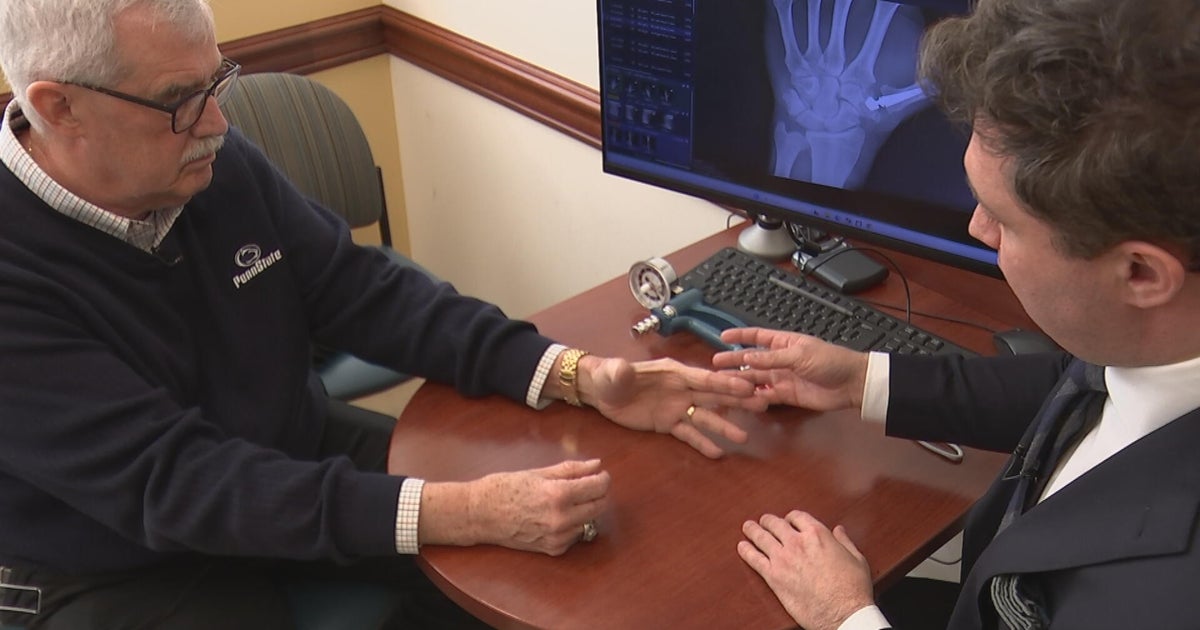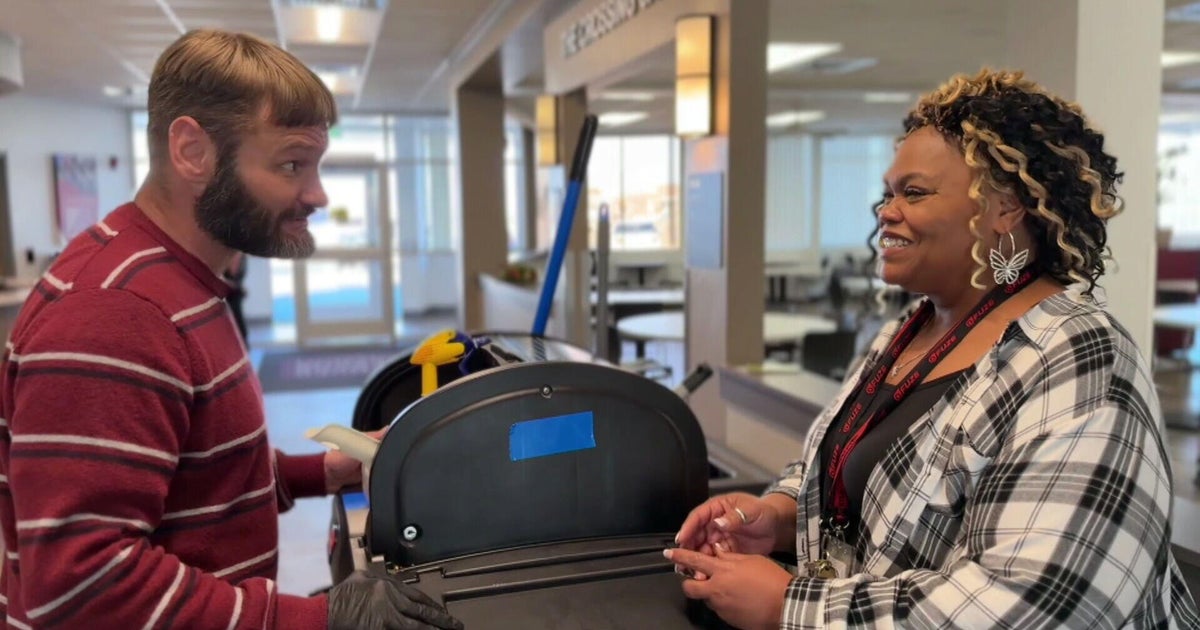Getting Organized In 2013
BOSTON (CBS) - We were all told with the advent of computers we would be able to do away with paper. Our lives would be simpler. Ha!
Not so. We have laptops, tablets and phones to keep track of. And paper is still a very big part of our lives. Just look at the pile of mail most of us still get. Some of you are feeling smug for you have everything on your computer. You even have it saved to the cloud. Good for you! But I know that there is still important stuff you go looking for. Maybe it's now on your computer you search.
Experts say we spend 40 hours a year looking for the important stuff we put away in very safe places. We just can't remember which safe place we put it in!
Our lives are so much more complicated than our parents or grandparents.
Get yourself organized! Organize your computer. I like Outlook to help with my address book, calendar, and my To Do list. But I also keep a paper calendar on my desk and I know Anthony does also. Buy a calendar, a day planner, and something for addresses, or treat yourself to a smart phone.
If you are keeping track of the family schedule set up a large master calendar in the kitchen and give everyone a different color marker so they can put in the important stuff so you know when to pick them up or when to show up for a game or a meeting!
Next, tackle organizing the papers. Head to a large stationary store and get folders, possibly a shredder, filing crates, a filing cabinet, whatever will fit into the space you have available.
Then start gathering up the important stuff that you need to organize. You know where they are, in the safe places you have for filing now; a kitchen drawer, a desk, a closet, a shoebox.
Create piles on the dining room table. All of the taxes in one pile, the insurance papers in another, the car stuff, the birth certificates. Then go through the piles and toss out what you no longer need to keep.
Whatever you toss, be sure it's disposed of properly, shred it if possible. Leave no paper trail for it is so easy to steal someone's identity.
Once everything is organized, you will find life simpler for it will be easy to find the important things of your life and maybe, just maybe, you'll even be on time for the important things.
Well maybe not, but at least you'll know where you were supposed to be.
One more thing:
This is an excerpt from my book, Money:
How Much of This Stuff Should I Keep?
After plowing your way through your net worth and cash flow, you now have accumulated a pile of paperwork. So what do you do with all of this stuff? Here's the opportune time to get organized. You've been talking about it for years. Things just sort of pile up and then it takes days to find the papers you need.
Well you have off a couple of days and after the decorations are put away tackle your files!
A large, three-ring binder is a good beginning, especially if you don't have a lot of stuff. The first section is for your dreams. Put them up front, where you can review and update them on a regular basis. Next, put in your net worth and cash flow worksheets. Then, as you update them, file them here so you can see how well you are doing. Keep the old ones because it's a real morale boast as your assets increase.
The next section of your three-ring binder should hold the inventory worksheet. Take some time to fill out the Inventory and Location of Important Documents worksheet in Appendix A. I promise you that it will save time and energy in the future when you are looking for something. More important, if something should happen to you, someone can easily come in and find the important papers that may be needed.
Next on the to-do list is a filing system. It doesn't need to be elaborate. You could just use your three-ring binder if you don't have much stuff. A simple crate with hanging folders will do nicely. If you have the space, a filing cabinet is a real plus. A desk with your computer on it and deep drawers to hold your files would be best. Envision an organized spot where most of the important papers in your life are in one place. It would be ideal to have an office area in your home where things are kept, maybe near the computer, especially if you use the computer to monitor your checking account or your portfolio.
Your filing system should be simple. Divide your filing system into those categories: personal documents, estate-planning documents, and so on. The more stuff you have the more elaborate and detailed the system will need to be. If you do decide to use your computer to keep track of this information, make a paper copy and put a backup disk in this file.
This is also a good time to weed through your stuff, keeping what is necessary and tossing out what you no longer need. The Inventory and Location of Important Documents worksheet will give you a good idea of what should be kept. Common sense should prevail. If you are going to need anything in the future, you should keep it, but things like checks to the grocery store can be safely thrown away.
Master File
Set up a master file that contains lists of all of your assets and all of your important documents (wills, trusts, durable power of attorney, medical directives, and passports). List all of your advisors and their updated addresses and phone numbers. Do the same for insurance policies, credit cards, investment, and bank accounts.
Taxes: Maintain a separate file for each calendar year for your personal tax data: records of income, transactions such as property sales, itemized deductions, etc. IRAs or pension contributions should be noted in this file as well as having a folder of their own. Keep copies of Form 1099s, as well as any documentation of your deductions, such as cancelled checks.
Banking: When reconciling bank statements (and you should be doing this monthly), transfer any canceled checks needed for tax documentation to the current year's files. Keep all checks that relate to the house, e.g., new roof. You'll need these when you sell your home, to help establish its cost basis. File these in your real estate file. Keep all other checks for one year. Retain check ledger and bank statements for at least seven years.
Stocks, Bonds, and Mutual Funds: It's best to maintain a file for each account and a folder for each holding. Keep all cost information relating to investments, so you can determine your cost basis when you sell them, to determine whether you had a profit or a loss. Keep copies of all 1099s—the form sent to you by the fund indicating capital gains and dividends paid during the year. You'll need all those old 1099s to determine the cost basis for your mutual funds.
Insurance Policies: You want separate folders for each type of insurance you have. Keep the most recent policy in your current file, along with any endorsements or addendum. Also keep old policies that provide liability protection, such as your homeowner's policy, for at least three years, just in case you should find yourself facing a lawsuit. Records of pending and paid health insurance claims should be kept in a separate file labeled "medical insurance payments."
Credit Cards: Retain the loan agreements and any new information the card issuer may send out with your monthly statement. Retain purchase slips and billing statements for at least one year. Staple all pertinent charge slips to the warranties so if you have to return an item you can find the paperwork. Maintain a list of all card numbers and the phone numbers to call in the event a card is lost or, worse, stolen.
Real Estate Documents: Closing papers, settlement sheets, deeds, and titles should be maintained in a separate file for each property. Keep copies only. The originals should be in a safety deposit box or fireproof safe. Keep in this file any documents, such as canceled checks or receipts, for work that increases the cost basis of your real estate.
Ownership Papers: Purchase records, receipts, and other items pertaining to ownership of cars, boats, or other large equipment or appliances should be maintained in separate files, with the warranties and instruction books. If something goes wrong, you know where to look.
Employment Records: Keep information relating to employee benefits, employee contracts, and copies of W-2s. Keep the W-2s until you are able to reconcile them with Social Security benefit statements.
Tax Returns: Keep copies of your tax returns for at least seven years. The IRS in most instances has three years to audit a return, unless they suspect fraud, in which case there's no time limit.
Warranties/Service Contracts/Instruction Booklets: File warranties and service contracts along with the receipts, in case you have to return an item or have it serviced. Maintain a file for instruction booklets, which you should update as you purchase new items.
Personal Data: Originals of personal records such as birth certificates, marriage certificates, adoption papers, military service documents, and divorce decrees should be stored in a safety deposit box or a fireproof safe. Original wills and trusts are best kept in another safe place, such as your lawyer's safe. This is because safety deposit boxes are often sealed upon death. Keep copies of wills, trusts, original durable powers of attorney, and medical directives in a safe but accessible place in your home.
Monthly Bills: Monthly phone, electricity, fuel oil, gas, and grocery bills can be filed in a house or maintenance file or individually. Keep for one year and then discard. You can keep lists of your annual expenses for comparison purposes.
Pensions and IRAs: Set up a permanent file for each retirement plan. File all annual statements showing contributions, distributions, and any rollovers. If you file IRS Form 8606, which is for a non-deductible IRA, keep copies in this file as well.
Miscellaneous: Now that so many people own video cameras, videotape your home and its contents, to create a permanent record of all of your valuables. This will be helpful in the case of a robbery or a fire. Store the video in a safety deposit box or a fireproof safe. If you don't have a video of your home and its contents, keep a list of your belongings in a safe place and take pictures of your possessions. We know how tedious it can be to draw up a list but, as you've probably now discovered, you own a lot of stuff and you need to take steps to protect it.
Organizing your stuff will give you a sense of accomplishment. But what's more important is that it will be a gift to your family. I would also recommend that, as you get on in age, you hold annual family meetings to let everyone know where your stuff is located. No, not where the car keys are, but where you keep your files. Tell them if you've changed or added advisors in the last year and give them updated lists. After completing the document locator worksheet, make a copy for your files and then give a copy to your attorney, a family member, or a trusted friend for safekeeping.







